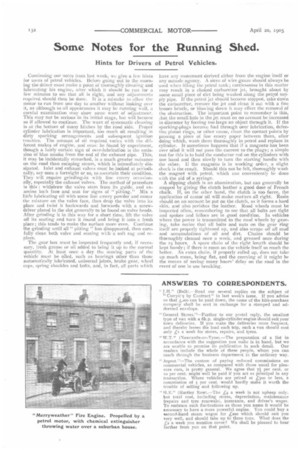Some Notes for the Running Shed.
Page 16

If you've noticed an error in this article please click here to report it so we can fix it.
Hints for Drivers of Petrol Vehicles.
Continuing our notes from last week, we give a few hints for users of petrol vehicles. Before going out in the morning the driver must make a point of thoroughly cleaning and lubricating his engine, after which it should be run for a few minutes to see that all is right, and any adjustments required should then be done. It is a mistake to allow the motor to run from one day to another without looking over it, as although to all appearances it may be running 11 ell, a careful examination may show some want of adjustment. This may not be serious in its initial stage, but will, become so if allowed to continue. The want of systematic cleaning is at the bottom of many hitches by the road side. Proper cylinder lubrication is important, too much oil resulting in dirty sparking arrangements and subsequent ignition troubles. The amount of oil required varies with the different makes of engine, and musz be found by experiment, though a fairly certain sign of over-lubrication is the emission of blue smoke from the end of the exhaust pipe. This, it may be incidentally remarked, is a much greater nuisance on the road than escaping steam, which is inimediately dissipated. Inlet and exhaust valves muse be looked at periodically, say once a fortnight or so, to ascertain their condition. They will require grinding-in with line emery orcasionally, especially the exhaust valves. The method of procedure is this : withdraw the valve stem from its guide, and examine both face and seat for signs of " pitting." Mix a littk lubricating oil with some line emery powder and smear the mixture on the valve face, then drop the valve into its place and twist it backwards and forwards with a screwdriver placed in the slot generally to be found on valve heads. After grinding it in this way for a short time, lift the valve off its seating and turn it round and bring it into a fresh place; this Lends to make the surface more even. Continue the grinding until all " pitting " has disappeared, then carefully clean both valve and seating with a soft rag and replace.
The gear box must be inspected frequently and, if necessary, fresh grease or oil added to bring it up to the normal quantity. At least once a day the moving parts of the vehicle must be oiled, such as bearings other 'than those automatically lubricated, universal joints, brake gear, wheel caps, springshackles and bolts, and, in fact, all parts which have any movement derived either from the engine itself or any outside agency. A sieve of wire gauze should always be used when filling the petrol tank; carelessness in this matter may result in a choked carburetter jet, brought about by some small piece of dirt being washed along the petrol sup. ply pipe. If the petrol jet should become stopped, take down the carburetter, remove the jet and clean it out with a finc broom bristle, or blowing down it may effect the removal of the obstruction. The important point to remember is this, chat the small hole in the jet must on no account be increased in diameter by forcing too large an object through it. If the sparking-plugs become foul through over lubrication, defective piston rings, Or other cause, clean the contact points by passing a piece of line emery paper between them, after doing which, wash them thoroughly in petrol and replace in cylinder. It sometimes happens that if a magneto has been over oiled it will not pass the current to the plugs; a simple test for this is to hold the conductor rod on the cylinders with one hand and then slowly to turn the starting handle with the other. If the magneto is in working order, a slight shock is the result. Should this not be felt, thoroughly wash the magnet with petrol, which can conveniently be done with the aid of a syringe. A slipping clutch is an abomination, but can generally be stopped by giving the clutch leather a good dose of French chalk. If, on the other hand, the clutch is too fierce, the application of castor oil will make matters all right. Resin should on no account be put on the clutch, as it forms a hard skin, and also perishes the leather. Road wheels must be inspected often, remembering to see that all bolts are tight and spokes and felloes are in good condition. In vehicles where the power is transmitted to the road wheels by gearing, take notice that all bolts and nuts on the gear ring itself are properly tightened up, and also scrape off all mud and accumulations of oil and dirt. Chains should be thoroughly cleaned once a week, and greased once during the 24 hours. A spare chain of the right length should be kept hardy ; if there is room on the vehicle itself. so much the better. An extra chain, if properly rolled up, does not take up .much room, being flat, and the carrying of it might be the means of saving many hours' delay on the road in the event of one in use breaking.




















